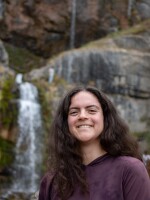Pueden encontrar la versión en español aquí.
__
On a Tuesday evening in Ogden, a Utah resident from Mexico shared her life story with two volunteers.
The trio sat around a table at a community resource center. One volunteer typed answers into a questionnaire while the other translated back and forth. They asked the woman about her history in the United States and why she was seeking help with her immigration status. Across the room, a similar conversation played out.
This was an intake appointment at the NOMAS, or No More A Stranger Foundation, free legal clinic. The nonprofit now offers these sessions weekly in Ogden, Logan and Salt Lake City, up from once a month. It also partners with Brigham Young University’s Community Legal Clinic in Provo.
After the intake, an attorney reviews each case and decides whether NOMAS can help.
The clinic, which launched in 2020, represents clients on immigration cases like green card petitions, humanitarian visas for victims of trafficking or other crimes and asylum for those who aren’t already in immigration court, among others. They have limited support for clients in immigration court, said Katie Rane, executive director of NOMAS. Rather, they focus on paths to legal status that play out outside of court.
“We're not just preparing the paperwork and presenting it, but we'll represent them all the way through,” Rane said of the cases they take on. Some financial aid is also available to help clients with filing fees.
The clinics have limited staff and rely on volunteers, who can take a course in the fundamentals of immigration law and use their work at the clinic toward accreditation from the Department of Justice. Some volunteers who complete the program go on to pursue law school or advocacy work, while others stay on with NOMAS.
In Ogden, Fernanda Daines became a citizen with help from NOMAS.
Since taking the oath of citizenship, she’s felt more calm and secure in the United States.
“When you leave your country too, you feel like you're not part of that country or part of this country either,” she said. “But this gives you a little bit more of like, okay, ‘I belong somewhere too.’”
Now, she is a partially accredited representative and legal fellow for NOMAS. Helping others at the clinic has connected Daines to the immigrant community and made her feel good. Many people who come to NOMAS found they could not afford a typical attorney, so the clinic supports them to the best of their ability.
“With the clients that we accepted, we are working on their case and helping them online, I mean, review and signing all this kind of stuff,” she said. “So it's super busy every week, doing everything at the same time.”
But the work isn’t just about helping immigrants with their legal cases, Rane said. The goal is to bring immigrants out of the shadows and make the entire community stronger. That’s visible in the nonprofit’s full name, No More A Stranger Foundation, which is a nod to the New Testament scripture “I was a stranger, and ye took me in.” In Spanish, “no más” means “no more.”
Immigration issues can keep people from integrating into society, Rane said. When people are more comfortable being out in the community and contributing to society and the economy, she sees that as a benefit to everyone.
“I think we're safer when everyone is integrated and comfortable. There's less isolation, so there's less animosity, or less hatred.”
Macy Lipkin is a Report for America corps member who reports for KUER in northern Utah.






